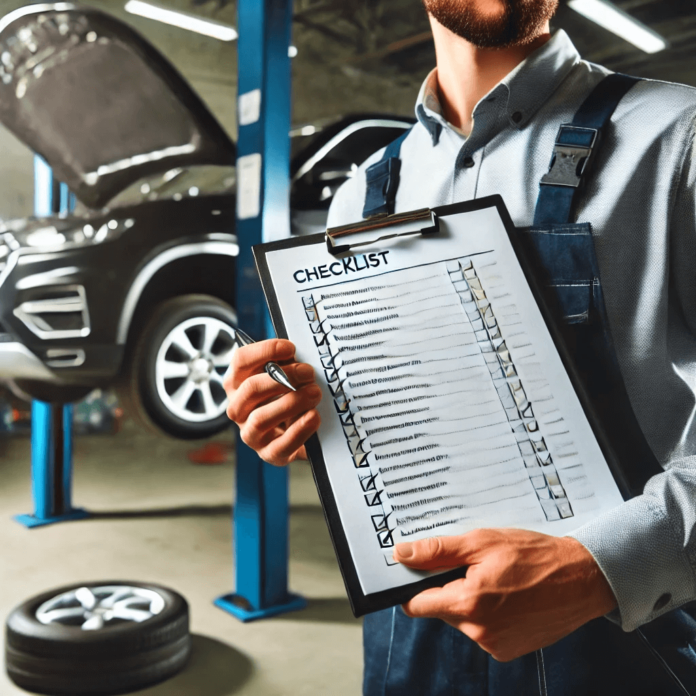Introduction
- Full Car Service Checklist: Essential Maintenance Tasks for Your Vehicle
- What is a Full Car Service?
- Vehicle Inspection
- Oil and Filter Change
- Brake Inspection and Maintenance
- Tire Check and Rotation
- Suspension and Steering System Check
- Battery and Electrical System Check
- Fluid Level Checks
- Air and Cabin Filter Replacement
- Exhaust and Emissions Check
- Windshield Wipers and Washer Fluid Check
- Test Drive
- Conclusion
- FAQs
A full car service checklist includes all the critical maintenance tasks required to ensure your vehicle operates efficiently and remains in top condition. If you’re wondering what happens in a car service, expect a comprehensive inspection of your car’s engine, brakes, tires, and more. The car service details include oil changes, fluid checks, tire rotations, and brake inspections, ensuring your vehicle stays in peak condition and prevents costly repairs in the future. This guide will walk you through each step of a full car service and explain its importance for vehicle longevity.
Full Car Service Checklist: Essential Maintenance Tasks for Your Vehicle

A full car service checklist ensures your vehicle is thoroughly inspected and maintained for optimal performance. Important tasks involve changing the oil and filter, inspecting the brake system, checking and rotating tires, topping up fluid levels, and testing the battery’s health. Technicians also assess the suspension, steering, and exhaust systems, ensuring everything is functioning correctly. By following this comprehensive checklist, you can extend your vehicle’s lifespan and avoid unexpected breakdowns.
What is a Full Car Service?
A full car service is a comprehensive maintenance procedure that goes beyond the basics of an interim service. It includes a thorough inspection of all key vehicle components and is typically performed once a year or every 12,000 miles. Unlike a basic oil change or tire check, a full service covers everything from fluid levels and brake performance to exhaust emissions and tire condition, ensuring your car stays in top shape.
Vehicle Inspection
The first step in a full car service is a comprehensive visual inspection. Technicians check the condition of critical components, including belts, hoses, and seals, to ensure there are no visible signs of damage or wear. This inspection helps identify any potential problems early, preventing breakdowns and expensive repairs down the line.
Oil and Filter Change
One of the most important tasks in a full service is the oil and filter change. The engine’s old oil is removed, and fresh oil is added to enhance performance and minimize wear on engine components. The oil filter is also replaced to ensure that contaminants don’t enter the engine, keeping it running smoothly.
Brake Inspection and Maintenance
A full service includes a thorough brake system check, where technicians inspect the brake pads, discs, and fluid levels. If any components are worn or damaged, they’ll be replaced to ensure optimal braking performance and safety. Regular brake maintenance is essential for preventing accidents and costly repairs.
Tire Check and Rotation
Maintaining your tires is essential for safety and optimizing fuel efficiency. During a full service, technicians inspect tire pressure, tread depth, and overall condition to ensure proper function. Tire rotation is often performed to ensure even wear, which prolongs the life of your tires and enhances driving performance.
Suspension and Steering System Check
The suspension and steering system are inspected during a full service to ensure smooth handling and a comfortable ride. Technicians will look for signs of wear or damage in suspension components and address any issues with steering alignment or control, helping to prevent steering or stability problems.
Battery and Electrical System Check
Your car’s battery and electrical systems are essential for reliable performance. Technicians will test the battery to ensure it holds a proper charge and inspect the electrical system, including lights, fuses, and wiring. If there are any issues with the battery or electrical connections, they’ll be addressed during the service.
Fluid Level Checks
A full service involves checking and topping up essential fluids. This includes brake fluid, coolant, transmission fluid, and power steering fluid. Maintaining proper fluid levels is crucial for keeping your car’s components lubricated and functioning correctly.
Air and Cabin Filter Replacement
Replacing the engine air filter is important for maintaining efficient air intake, which improves engine performance. The cabin filter is also replaced to ensure clean air inside the vehicle, which is particularly beneficial for those with allergies or respiratory issues.
Exhaust and Emissions Check
The exhaust system is inspected for leaks, damage, or rust, while emissions are tested to ensure your vehicle meets environmental standards. If there are any problems with the exhaust system or emissions, they’ll be fixed to improve fuel efficiency and reduce environmental impact.
Windshield Wipers and Washer Fluid Check
To maintain visibility in all weather conditions, technicians will inspect the wiper blades and replace them if they are worn. The washer fluid is replenished to ensure you can maintain a clean, unobstructed windshield for optimal visibility.
Test Drive
Finally, a test drive is performed to assess your vehicle’s overall performance. Technicians will look for issues with handling, braking, engine responsiveness, and steering. This final step ensures that your car is functioning properly and is ready for the road.
Conclusion
A full car service is essential for keeping your vehicle in optimal condition. From oil changes and brake checks to suspension and tire maintenance, regular servicing ensures that all aspects of your car are well-maintained. By investing in a full service, you can extend your vehicle’s lifespan, improve performance, and ensure safety on the road.
FAQs
1. How often should I get a full car service?
A full car service is typically recommended once a year or every 12,000 miles, whichever comes first.
2. What’s included in a full car service?
A full service covers essential checks like oil changes, brake inspections, tire rotations, fluid top-ups, and a thorough inspection of the engine, suspension, and electrical systems.
3. Why is a full car service important?
Regular full servicing helps prevent breakdowns, extends your car’s life, improves fuel efficiency, and ensures your safety on the road.
4. How long does a full car service take?
A full car service typically lasts between 2 to 4 hours, depending on the vehicle’s condition and whether any extra repairs are needed.
5. Can a full car service prevent costly repairs?
Yes, a full service helps identify potential issues early, preventing them from developing into expensive repairs later.














